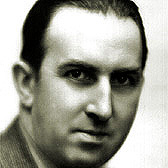
Irishman topped London's Tin Pan Alley in 1930s
Jimmy Kennedy
InducteeWrote 2000 songs in career spanning 50 years
While Jimmy Kennedy was a true son of Ireland, the appeal of his music is lasting and universal and stretches far beyond the Irish Sea and the beautiful, inspiring West country. If music indeed is international, Kennedy's many memorable songs are living proof of the fact. They began their lives in Ireland, came into flower on Denmark Street, London's Tin Pan Alley, and spread out to the world. He wrote more than 2,000 songs overall and their sales in sheet music and records reached into the millions. And each of those memorable songs had a story all its own.
He watched a small yacht sailing languidly westward into the setting sun off Portstewart, Northern Ireland and wrote the immortal "Red Sails in the Sunset." In a dense fog, his car's headlights picked out an English pub sign, "Harbor Lights," and his song of that name became an instant sensation. In a British Sunday paper, he read that the English music hall star, Gracie Fields, would be holidaying in her villa in Capri, suggestion enough for him to write, "The Isle of Capri." And when his sister wrote from Southern California that "Today we've gone to Mexico, south of the border," another song came into being, "South of the Border (Down Mexico Way)."
An extraordinarily modest man, Kennedy was frequently seen as an 'unsung' hero, yet his lyrics were sung and recorded by a myriad of performing stars including, Bing Crosby, Perry Como, Ella Fitzgerald, Nat King Cole, Frank Sinatra, The Platters, Elvis Presley, Tony Bennett, Louis Armstrong, Roy Orbison: Tom Jones, Glenn Miller and countless others.
One of the biggest hits in the illustrious career of The Platters, was one of Jimmy Kennedy's finest, "My Prayer," which reached number two in the American Hit Parade, when "South of the Border," which ultimately was recorded over 300 times was number one. The feat in 1939 was not accomplished again until Lennon and McCartney did so in the sixties. The "Cokey Cokey" was one of the biggest dance sensations of the war. "April in Portugal", one of the most recorded songs of the fifties and "Red Sails in the Sunset" were among his biggest earners, while "Teddy Bears' Picnic," written in 1932, was not far behind.
Kennedy had the native ability to put a little story into a succinct lyric and match it to a tune, usually composed by a co-writer. One of these colleagues, Michael Carr, relating a conversation overheard in a train to Dublin, inspired yet another song. He heard an Irishman ask a young lady if her mother was Irish, "No," came the response, "But my father was." Kennedy soon created yet another winner in the worldwide sweepstakes, "Did Your Mother Come from Ireland?" which became an enormous hit in America. It also was a major record success for Bing Crosby, who had already recorded 14 Jimmy Kennedy songs.
Born in Omagh, County Tyrone in 1902. While fame eluded Kennedy during his lifetime, an award in his name, to mark outstanding contributions to the craft and tradition of professional songwriting, was added to the British Academy of Songwriters' annual Ivor Novello awards, and he was awarded the OBE in 1983. Kennedy was inducted posthumously into the Songwriters Hall of Fame in 1997.
In Portstewart, where the lyrics of "Red Sails in The Sunset" were originally penned, his genius has been recognized by the erection of a ten foot tall 'Fishing Boat' sculpture and plaque which now dominates the famous promenade. And, thanks to the enthusiasm of local admirers, the boat mentioned in the song, "Kitty of Coleraine," has been restored and put on public display in the town.
Jimmy Kennedy died in Cheltenham, England in 1984.






